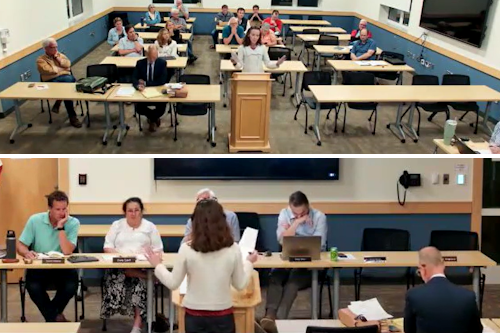Above: Last night, some of the residents defending themselves against the lawsuit filed by Park Central LLC spoke out at a ZBA hearing. (images cropped from meeting video)
Last night, the Zoning Board of Appeals voted to deny the permit for a controversial 200 unit 40B development project at Park Central.
The most likely scenario is the case will be appealed. And attorneys for both the developer and the Town seem to agree that it is unlikely for the project to get thrown out all together.
The board’s unanimous decision was made after learning that the court case could continue to drag on for years. An attorney for the developer, who filed the lawsuit against abutters, indicated they wouldn’t initiate efforts to settle.
Attorney Jason Panos assured that the action would result in appeal to the Mass Housing Appeals Committee (HAC). He warned the most likely outcome would be for HAC to take the case from the board and conduct the permitting themselves. That would mean the Town would lose “local control” of the decision details.
Town Counsel, Jay Talerman, disagreed that it was likely, but acknowledged it was a risk. He opined HAC will more likely remand the case back to the ZBA.
Talerman didn’t believe HAC would want to take on the burden for all of the evidentiary findings that still need to be conducted (with engineers, peer reviews, etc.) He described that as an action they take when a board has been dragging its feet, which would make sending the project back “a fool’s errand”.
Counsel opined that HAC should understand that the board wasn’t the problem. He described the applicant as having put the Town in this position by prematurely filing for a permit then initiating the lawsuit that is holding it up. He described the lawsuit against abutters as a “tacit acknowledgement” that there was a legal issue that needs to be resolved.
(For those unfamiliar, you can read about the lawsuit over a 2015 Covenant between the developer and abutters related to the acceptable details of a development project here.)
Board member Doris Cahill wanted to know why the developer hadn’t made an effort to settle with abutters, Attorney Panos claimed that with so many defendants, they don’t know what each one wants. He said that he would be happy if they brought him a laundry list.
Board Mike Robbins said he found that “disingenuous”. The sentiment was echoed by other board members and commenters throughout the hearing.
Both Cahill and Robbins referred to the agreement that William Depietri of Capital Group Properties signed with abutters in 2015 as outlining what they want. Later Robbins said that he had been bothered from the beginning that simply filing the permit was a breach of agreement with the abutters, and that continuing the hearings continued that breach.
Before voting, the board heard from some abutters, including three that were signatories on the 2015 agreement.
Elizabeth Whitney told the board:
there is no resolution in sight. and it’s not because it’s a complicated case but it’s because Mr Depietri and his legal team have employed tactics to draw out this case.
At first glance, the dispute seems relatively straightforward. it really boils down to the interpretation of just one section of the 2015 agreement that’s titled the abandonment of project. According to this section when Mr. Depietri chose not to appeal the Worcester Superior Court’s 2022 judgment, he was required to adhere to that section in order to terminate the agreement. Instead Mr. Depietri filed a lawsuit against me and my husband and my neighbors.
Panos told the board that the lawsuit was filed in response to having received a letter from the attorney for two of the abutters, Dante and Wendy DeMichaelis, threatening a “93a” claim for breach of contract.
Brian Gray told the board that he signed the initial agreement because he was pressured to at the time by the ZBA. And he hadn’t taken any actions, threatened to sue, or even followed the news that closely, until he was sued.
Both Gray and Whitney described aggressive tactics by the developer’s attorneys, involving days of depositions in Boston. Gray indicated he believed that the developer’s motive is to make the process painful enough for the majority of signatories to sign a document that wipes away the agreement.
Wendy Demichaelis noted that both the board and the Land Court judge had urged the developer to reevaluate the plan and start talking to abutters. But they haven’t. She said that she and her husband alone had already spent $20K on attorney fees.
Speaking as a public commenter, recused member Jamie Meitz said that she hopes that even if the abutters lose in court and the matter is remanded back to the ZBA, the board will choose to include the terms of the 2015 agreement as conditions.
Board members agreed that continuously kicking the can down the road with continuances creates unnecessary stress. They decided to close the hearing and deny the permit.
Their next step is to meet with Town Counsel to finalize the written decision. In a news flash today, the board explained:
A new meeting has been scheduled for September 20, 2024 at 2:00 PM for the Board and Town Counsel to review, edit, and finalize the written decision. This meeting will take place on Zoom only, and while it is a public meeting and open to virtual attendance, it is a discussion item only and not a public hearing.


